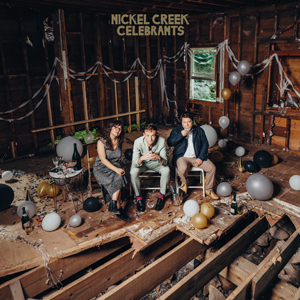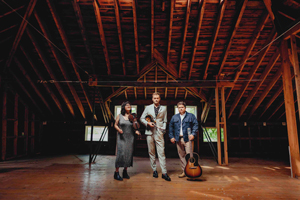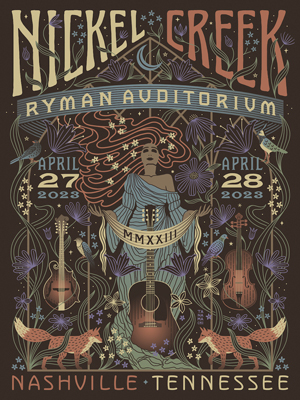
album artwork / click for hi-res version

Photo credit: Josh Goleman / click for hi-res version

Photo credit: Josh Goleman / click for hi-res version
Nickel Creek
“My God it’s good to see you…”
Celebrants
That first line from Nickel Creek’s seventh album Celebrants likely prophesies the warm response awaiting the Americana-bluegrass group’s first all-new release in nine years.
While the Grammy-winning trio of singer-songwriter-multi-instrumentalists Sara Watkins (fiddle), Sean Watkins (guitar), and Chris Thile (mandolin) had sporadically collaborated since 2014’s A Dotted Line, a 2020 interview pegged to the twentieth anniversary of Nickel Creek’s debut album ignited a spark. “It was fun to have a reason to wax nostalgic about some stuff that we'd done,” says Thile. “And then when we got together, it was just so clear, ‘Oh, yeah, we've got some new music to make.’"
They certainly did. The long layoff yielded a bounty of 18 interconnected songs written collectively during a creative retreat in Santa Barbara in early 2021. The tracks form a mosaic that is beautiful from a distance, but each tile also tells its own story.
“We wanted it to be our most ambitious album,” says Sean Watkins, “meaning spending the time that we've never had to fully explore our musical ideas and take them as far as we possibly can.”
To assist in bringing that vision to fruition the Watkins siblings and Thile decamped to RCA Studio A in Nashville with trusted producer Eric Valentine (Queens of the Stone Age, Grace Potter, Weezer) and recruited Grammy-winning producer-songwriter Mike Elizondo (Fiona Apple, Eminem, Joy Oladokun) to hold down bass duties and serve as another set of ears.
The result is perhaps the most audacious yet accessible release of the Grammy-winning trio’s 34-year career. The wide-ranging soundscapes include the melodic pop elation of “Celebrants,” the gauzy, the hazy harmonic swirls of “The Meadow,” the gentle balladry of “Holding Pattern,” and the yearning “Failure Isn’t Forever,” which brightly bends towards hope. The entire enterprise is, naturally, shot through with the trio’s virtuosic picking and shiver-inducing harmonies. The lyrics —addressing love, friendship, time, and the universal travails of travel— combine the poetic and plain-spoken, hitting a sweet spot of ethereal and relatable as bridges are built, crossed, burned, and rebuilt.
“My favorite music is beautiful or exciting and makes me curious and think ‘I want to hear that again!’” says Sara Watkins. “In the first day or two of writing we knew that we wanted each song to stand alone as something that's special and complete, but in the context of a complete album, each song just has a whole new dimension.”
It had been several years since you all were together writing and recording. How was it when you reconvened in Santa Barbara to start writing for Celebrants?
Chris: The funny thing about the three of us is that when we’re in a room together, it's like the space time continuum contracts and it's just the day after the last time that we hung out. I almost feel like we might even pick up the last conversation without even missing a beat.
Sean: We talked about albums that were just wild and adventurous musically, but also very pleasing to the common ear. One album that we all love, it's not even really an album, is the Brian Wilson/Beach Boys project that became Smile. He was aiming for something transcendent and so much bigger than anything he'd ever done. And that's always been super inspiring to us.
Sara: We also talked a lot about sequencing which led us, while we were composing, to think about little themes that could come back throughout. Rather than avoiding a certain tempo or feel or melodic thing to avoid repeating ourselves we started thinking, how can we repeat ourselves? How can we connect the dots? To show how all these things are related and to lean into how many themes in the three of our lives overlap. So it was very important to us to live together and write this because in the past we'd be living together on tour and writing or holing up and just spending all day every day together and the conversations become the record. It's not like, “I’ve got a song idea.” It's sharing life experiences and problems as friends and realizing where the overlap is and, "Oh yeah, I've been thinking that, too."
And living together did you discover a lot of overlap?
Chris: That's a crazy, beautiful, aspect of the whole thing. Hanging together with our families, it really fueled one of the themes. Togetherness is the overarching muse. But the aspect of romantic togetherness that we focused on, really derived from that experience of, seeing each other, these people that we have known since we were small children, in mid-relationship. There are so many songs about the start of relationships. "I love you so much. You're amazing." And there's so many songs about the end of relationships. "I hate you so much. You ruined my life." There are fewer songs about the less sexy aspects of being together. The beautiful slog is the only way I can put it. We all go through it. The routine. And there are parts of the routine that are cherished and parts of the routine that are loathed. And if you love that person enough, you will deal with the parts of the routine that you loathe for the parts of the routine that you cherish.
It seems like that would also be true for you as bandmates.
Sean: I remember Chris saying what he just said maybe on the first or second day and thinking, "That is so great." And so, we thought, "Here we are, in this band, so many years later.” I don't think we could ever have imagined that it would last this long in a healthy way, like it has. We tried to take that theme and expand it from the angle of our personal romantic relationships, and then the band angle, and then also zoom out even further. Community. Country. The way we relate to each other as Americans. As people that live on Earth.
Chris: We ultimately get to species.
You mention in the notes that Celebrants is “a record about embracing the friction inherent in real human connection.” The songs, whether they’re about friendship, romance or simply interfacing with the world, explore that concept. How did you pick that as the title?
Sara: When we went through all the lyrics, it felt like that was the best. That was the thing that connected the record. We knew it was going to be the opening track. And it was also, I think, one of the primary feelings that we want people to come away from with this as they take the journey of the record. It starts with a sense of celebrating within, and then at the end, it's a celebratory statement that failure isn't forever.
Eric Valentine also produced your last two albums. What does he bring to the process?
Sara: I have many favorite things about working with Eric in this band but one of the things that I noticed for the first time on this album is that he is mixing from the word go. He’s imagining how it’s going to sound fully mixed. Also with our history, he knows our instruments, he knows how to place them in the mix, panning physically, and where space can be added, and where it needs to disappear in order to have the biggest dynamic effect. It's just a huge advantage.
Sean: While also listening to the lyrics, and reading the lyrics, and listening to the parts. Doing all that at once. He really gets granular. You might think that he's not paying attention to a little line or something that one of us is playing. And if you played a note different, he'll be like, "I noticed something was a little different when you played it that time."
Mike Elizondo, of course, is also a world-class musician and producer. Chris, you’ve worked with him on “Live From Here” and Sara and Sean during your Watkins Family Hour shows. What was it like working with him in this capacity?
Chris: It's crazy we got to do that. He has such unbelievable instincts as a musician and is able to look at what we do from so many different perspectives, none of which we have.
The album ends on a hopeful note with “Failure Isn’t Forever,” as you conclude “We’re all in this together.” Why was it important to end with that one?
Sara: We knew pretty early on that it would be the last song. It felt like the end of a chapter to me, it addressed a lot of the main concerns on the album. We liked the hopefulness of it.
Sean: When we started thinking of it in terms of a continual piece, it started to feel to me a little bit more like a movie. There are different kinds of movie endings. There’s the really dark indie film that just ends with “life is death” and you feel horrible at the end. And then there's obviously the other end of the spectrum with the Hollywood ending. But I love movies where it's a little of both: “Yeah, this happened and it sucks, but there's hope.” Because that's how life is. You can hold multiple sentiments at the same time It's complex and “Failure Isn’t Forever” really encapsulates that.
You also give the sense that it's not false hope, but cautious optimism, which feels useful right now.
Sean: Yeah, it's balanced.
Sara: It's the way forward.
Throughout your careers you’ve all worked in various configurations with one another, in other groups and solo. What do you get from each other that you can't get anywhere else that keeps you coming back to Nickel Creek?
Sean: We have this crazy connection that's lasted so many years and we've seen each other through so many different phases of life and been able to stay relevant in an honest way. We're not trying to keep this alive. It honestly is just alive. We nurture it, but it's just there. I think the older I get and see how many bands are dysfunctional, I appreciate what we have. And then on top of that, musically, it's 100% fulfilling. As we've matured as a band, we've leaned on our strengths more. It's just so fun. For me, singing three-part harmony with Sara and Chris is the best feeling. When we're really doing it right, it doesn't get better than that.
Chris: There’s no substitute for time spent together, you know? Take these old instruments we all play. Mine was built in 1924, so sound has been vibrating through it for almost 100 years. You can make a mandolin or violin or guitar now with the same care and skill and materials, but there's no substitute for what age and use does to the wood. That’s what Sara, Sean, and I have together. We started this band in 1989, and at this point, music just vibrates through us in a different way than I’ve experienced in any other collaboration.
Sara: It's cheesy to say, but it feels like coming home when we are together. But what is so valuable to me in my life about this band is it's never about recreating something that happened when we were kids. Nickel Creek continues to be the most challenging musical experience that I'm engaged in. It is invaluable to have the comfort and the history and the deep appreciation for the life we've shared so far, and to be making music that feels unique and challenges me in new ways to be a better musician. You can't have growth without a little resistance.
For more information, please contact
Asha Goodman, Catherine Snead 615.320.7753 or Carla Sacks at Sacks & Co., 212.741.1000.
